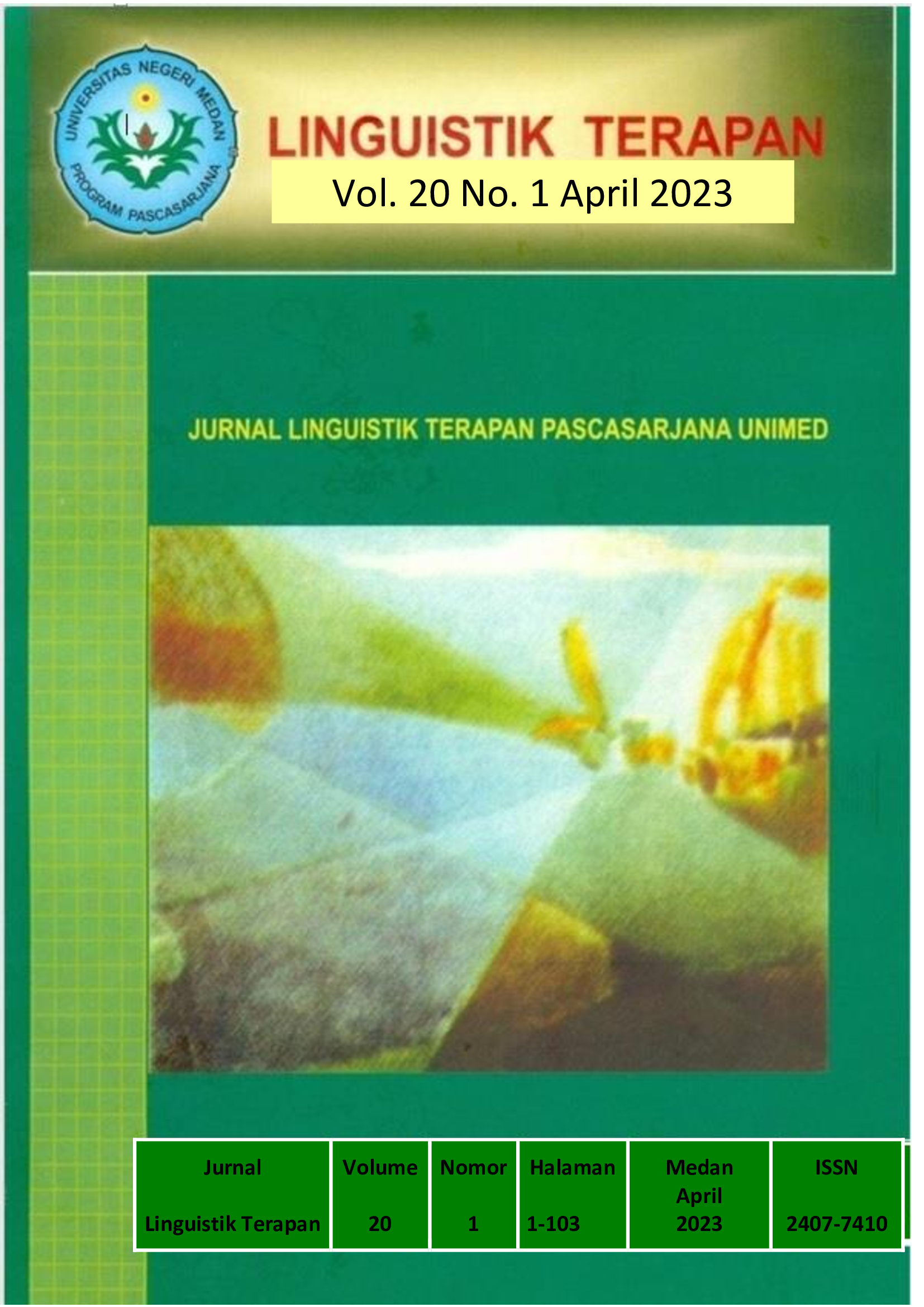TEACHERS` PERCEPTIONS OF DIGITAL GAME-BASED VOCABULARY LEARNING
DOI:
https://doi.org/10.24114/lt.v20i1.46634Keywords:
Digital Game-Based Vocabulary Learning (DGBVL), Elementary EFL Teachers, PerceptionsAbstract
The most problem in teaching and learning English that faced by the teacher is the students` lacks of vocabulary. The problem caused by the media used in teaching and learning process that makes the students feel bored, less motivation when joining the class. So, it needs the novelty learning media especially in teaching vocabulary, such as: Digital Game-Based Vocabulary Learning (DGBVL). This study investigates how the elementary EFL teachers` perceptions of DGBVL. It is used the qualitative research method with a case study design. 3 EFL teachers who work in Ulul Ilmi elementary school in Medan were interviewed. Data collected through interviews was analyzed using the descriptive analysis method. The study's findings indicated that teachers have generally positive perceptions of DGBVL. For the appropriateness, it was very good, appropriate for use as a learning media, can create an effective, creative, innovative, and fun learning process. For the content, teachers expressed their perception that in general, the content was sufficient, although it may be simplified more and that it was transferable to students. For the assessment, teachers expressed generally positive about the assessment as it was based on implementation. Teacher revealed that the biggest problem was time constraints, some students were still unable to operate DGBVLReferences
Chen, C. M., Liu, H., & Huang, H. B. (2019). Effects of a Mobile Game-Based English Vocabulary Learning App On Learners™ Perceptions and Learning Performance: a case study of Taiwanese EFL learners. ReCALL, 31(2), 170 “ 188. https://doi.org/10.1017/S0958344018000228.
Foster, A., & Shah, M. (2020). Principles for Advancing Game-Based Learning in Teacher Education. Journal of Digital Learning in Teacher Education. 36(2), 84-95. https://doi.org/10.1080/21532974.2019.1695553.
Hartt, M., Hosseini, H., & Mostafapour, M. (2020). Game on: Exploring the Effectiveness of Game-based Learning. Planning Practice & Research. 35(5), 589-604. https://doi.org/10.1080/02697459.2020.1778859
Hebert, C., Jenson, J., Terzopoulos, T. (2021). Access To Technology Is The Major Challenge: Teacher Perspectives On Barriers To DGBL In K-12 Classrooms. E-Learning and Digital Media. 18(3), 307“324. https://doi.org/10.1177/2042753021995315
Kahila, J., Valtonen, T., Tedre, M., Makitalo, K., & Saarikoski, O. (2019). Children™s Experiences on Learning the 21st-Century Skills With Digital Games. Games and Culture. 15 (6). https://doi.org/10.1177/1555412019845592
Li, R. (2021). Does Game-Based Vocabulary Learning APP Influence Chinese EFL Learners™ Vocabulary Achievement, Motivation, and Self-Confidence?. SAGE Open. https://doi.org/10.1177/21582440211003092
Li, R., Meng, Z., Tian, M., Zhang, Z., & Xiao, W. (2019). Modelling Chinese EFL Learners™ Flow Experiences In Digital Game-Based Vocabulary Learning: the Roles of Learner and Contextual Factors. Computer Assisted Language Learning. 34(4), 483-505. https://doi.org/10.1080/09588221.2019.1619585
Sung, H. Y., & Hwang, G. J. (2017). Facilitating Effective Digital Game-Based Learning Behaviors And Learning Performances of Students Based on a Collaborative Knowledge Construction Strategy. Interactive Learning Environments. 26(1), 118-134. https://doi.org/10.1080/10494820.2017.1283334
Tang, J. T. (2020). Comparative Study Of Game-Based Learning on Preschoolers™ English Vocabulary Acquisition in Taiwan. Interactive Learning Environments. https://doi.org/10.1080/10494820.2020.1865406
Tsai, Y. L., & Tsai, C. C. (2018). Digital Game-Based Second-Language Vocabulary Learning and Conditions of Research Designs: a Meta-Analysis Study. Computers & Education. 125, 345-357. https://doi.org/10.1016/j.compedu.2018.06.020
Wu, T. T. (2018). Improving the Effectiveness of English Vocabulary Review by Integrating ARCS with Mobile GameBased Learning. Journal of Computer Assisted Learning. 34(3), 315-323. https://doi.org/10.1111/jcal.12244.
Yang, K. H., & Chen, H. H. (2021). What Increases Learning Retention: Employing the Prediction-Observation-Explanation Learning StrategyiIn Digital Game-Based Learning. Interactive Learning Environments. https://doi.org/10.1080/10494820.2021.1944219
Zou, D., Huang, Y., & Xie, H. (2019). Digital Game-Based Vocabulary Learning: Where Are We and Where Are We Going?. Computer Assisted Language Learning. 34(5-6), 751-777. https://doi.org/10.1080/09588221.2019.1640745
Downloads
Published
How to Cite
Issue
Section
License
Copyright (c) 2023 Poppy Shania M. Sihombing, Anna Riana Suryanti Tambunan

This work is licensed under a Creative Commons Attribution-ShareAlike 4.0 International License.






